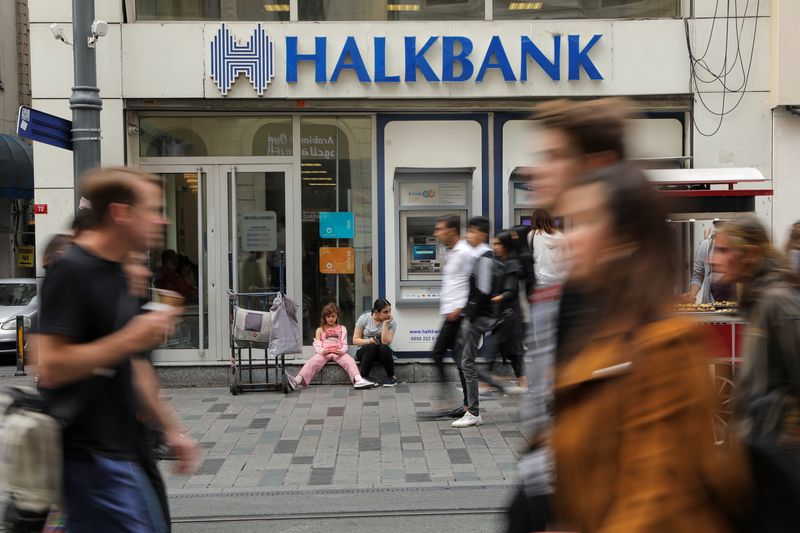NEW YORK (Reuters) -A U.S. appeals court on Tuesday said the federal government may prosecute Turkey’s Halkbank on charges it helped Iran evade American sanctions, rejecting the state-owned lender’s argument that it deserved immunity.
In a 3-0 decision, the 2nd U.S. Circuit Court of Appeals found no basis under centuries-old common law principles for foreign state-owned companies to be absolutely immune from U.S. prosecution related to commercial, nongovernmental activities.
Circuit Judge Joseph Bianco said the Manhattan-based appeals court should defer to the executive branch’s determination that the U.S. Department of Justice could prosecute Halkbank.
“Although certain prior cases extended immunity to state-owned corporations based on their governmental conduct, the common law places no independent bar on the prosecution of such corporations for their commercial activity,” he wrote.
He also wrote that a decision to prosecute foreign state-owned companies such as Halkbank, rather than impose tariffs or deny military aid to their state sponsors, “is not one for the judiciary to second guess.”
In response, Halkbank said in a statement to the Istanbul stock exchange: “Our Bank will use all its legal rights to appeal with regard to the October 22, 2024 decision of the Second Circuit, particularly with the U.S. Supreme Court.”
A spokesman for U.S. Attorney Damian Williams in Manhattan declined to comment on the court’s decision.
The appeals court panel was considering the case for the second time, following a related April 2023 decision by the U.S. Supreme Court.
U.S. prosecutors charged Halkbank in 2019 over its alleged use of money servicers and front companies in Iran, Turkey and the United Arab Emirates to evade sanctions.
Prosecutors said Halkbank helped Iran secretly transfer $20 billion of restricted funds, converted oil revenue into gold and cash to benefit Iranian interests, and documented fake food shipments to justify transfers of oil proceeds.
Halkbank pleaded not guilty to bank fraud, money laundering and conspiracy. The case became a thorn in U.S.-Turkey relations, with Turkish President Tayyip Erdogan calling the U.S. charges an “unlawful, ugly” step.
‘UNPRECEDENTED’
In 2021, the appeals court had concluded Halkbank could be prosecuted under the federal Foreign Sovereign Immunities Act of 1976 because its alleged misconduct involved commercial activity not covered by that law.
The Supreme Court later agreed that Congress’ desire to shield foreign countries and their instrumentalities from civil liability did not cover criminal cases.
But in a 7-2 decision, the high court said the 2nd Circuit should more fully review whether common law immunity shielded Halkbank.
The bank’s arguments included that the case concerned “diplomatic activity” because it included a charge based on Halkbank’s alleged misrepresentations to U.S. Treasury officials about its sanctions compliance.
During oral arguments on Feb. 28, Justice Department lawyer Michael Lockard said that was no reason to excuse Halkbank.
“For a foreign commercial bank, one that is majority owned by the state of Turkey, to launder billions and billions of dollars (to benefit Iran), to deceive banks, to lie to U.S. Treasury officials, that conduct is unprecedented,” he said.
The appeals court returned the case to U.S. District Judge Richard Berman in Manhattan. He ruled on different grounds in 2020 that Halkbank did not deserve immunity.
The case is U.S. v. Halkbank, 2nd U.S. Circuit Court of Appeals, No. 20-03499.




